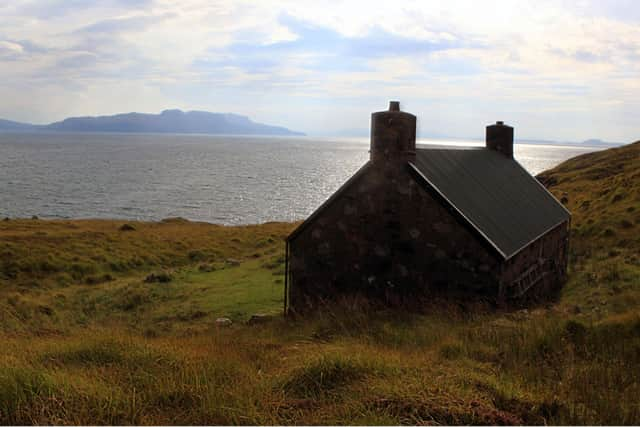EPC regulations: Rural housing stock in Scotland at risk with 'totally unrealistic' energy proposals, property experts warn
The threat to Scotland’s rural housing supply has been made worse by “totally unrealistic” energy targets set by the Scottish Government, rural property experts have claimed.
The tens of thousands of pounds needed to bring traditional, “hard-to-treat” buildings up to the standard proposed by ministers has already seen some landlords sell up or convert affordable rent homes into holiday lets, with others saying they may as well bulldoze older properties altogether.
Advertisement
Hide AdAdvertisement
Hide AdThe concern comes after the Scottish Government proposed all private rented sector (PRS) properties have to reach an Energy Performance Certificate (EPC) rating of C – A is best, G is worst – by 2028, but as early as 2025 if there is a change of tenancy that year. For all other home owners, it is looking like 2033.


For context, in 2019, of the 62 per cent of homes in Scotland that were owner-occupied, only 42 per cent were rated as EPC band C or better.
Ministers said the proposed targets would only apply to buildings where it is “technically feasible and cost-effective”, but that cost has not yet been clarified. The official legislation, which has been delayed, is due to be released later this year.
Property experts have said the delay in finalising legislation and the lack of detail how best to reach EPC C for historic buildings has led to a sense of panic in the rural sector. Some 19 per cent of Scotland’s housing is traditionally constructed buildings built before 1919, many of which are in the countryside.
A shortage of labour, higher costs of carrying out renovation works, lower rents, and the bespoke skills required for buildings in rural areas have been cited as some of the challenges rural landlords face with the proposed timeline compared to their urban counterparts.


Gordon Morrison, who owns multiple properties to let in rural Aberdeenshire, said: "The proposed targets are completely impractical and totally unrealistic or the scale and the types of housing we have. The EPC system is based on new builds.
"Rural estate landlords have multiple, traditionally built buildings, which will cost tens of thousands of pounds each to do up to reach these standards. It just won’t happen in the timeframe given."
Some landlords have said no matter how much money they spend on their buildings, they will not reach level C purely because of the fabric of the property. As an example of this, Savills provided a list of “typical” cases of the costs required to renovate older, rural dwellings and how the works influence the EPC rating.
Advertisement
Hide AdAdvertisement
Hide AdOne included an owner spending £50,000 on a detached stone farmhouse, which involved insulating the property with Kingspan, insulating the roof, and keeping the old oil boiler, which was in good working condition. The property only went from a low E to a D grade.


Property expert Anna Gardiner, from Scottish Land & Estates, said under the existing EPC assessment process, if landlords did not use renewables as a form of heating for the building, such as an air source heat pump, it seemed impossible to reach above a D rating.
"I know one member who spent £160,000 doing up a historic building only to be told it’s EPC D because of the type of property and because they still have an oil boiler,” she said. “And it is just not worth taking short-cuts with retrofitting insulation in old buildings, which are designed to ‘breathe’. You will have problems with vapour control, which will lead to mould and rot.
"The EPC reform that is proposed in the current consultation has created the opportunity for the Scottish Government to put more focus to the fabric of the building. This is something we would like to see so that the investment in energy efficiency measures in hard-to-treat properties are fully recognised. After all, the better insulated a property is, the lower the emissions from heating.
"If you have an efficient oil boiler, for example, and a well-insulated property, your energy consumption will be fairly modest by comparison to a poorly insulated property with an air source heat pump that’s having to go hammer and tongs. This really matters when fuel poverty is taken into consideration”.


Ms Gardiner said setting the bar “too high” for energy efficiency targets could lead to a “slapdash approach” to retrofit or properties being repurposed or mothballed because of the cost of the works required.
"That’s bad news for an already stretched housing market,” she said. "If the Government is not careful, they are going to make a housing situation in the rural sector a lot worse.”
Andrew Sinclair, who owns several properties at Balbeg, Ayrshire, said he had no choice but to either knock down his private rented three-bedroom house at £600 a month or turn it into a holiday home because of the looming targets.
Advertisement
Hide AdAdvertisement
Hide AdAmounting to some £150,000 to renovate the building to the proposed standards, Mr Sinclair said it would have been impossible to recoup a return letting it. “We just couldn’t see the numbers work with a residential effort because of the costs to meet these energy efficient regulations,” he said.
"When you spend that kind of money, a few hundred quid a month is not worth it. You might as well bulldoze the house.”
Dr Moses Jenkins, of Historic Environment Scotland, said he was “optimistic” the knowledge of how to retrofit older buildings was there, but there needed to be “more investment in a bespoke workforce to carry the works out”.
"We definitely need more skilled installers who understand the specific needs of traditional buildings,” he said. "We have a shortage of housing. We can’t bulldoze 19 per cent of the housing stock, so we need to reuse what we have.”
A Scottish Government spokeswoman said there would be a consultation on the proposals that could inform a Heat in Buildings Bill later this year, with the regulations “to follow”.
She pointed to funding in place to support owner-occupiers wishing to install an air source heat pump, and a “rural uplift grant” for homeowners in rural areas. Neither, however, are accessible to landlords in the private rental sector.
A consultation is underway on the metrics which determine a property’s EPC. Critics of the system say it is “outdated” and does not fairly reflect the energy efficiency of a dwelling.
Comments
Want to join the conversation? Please or to comment on this article.
